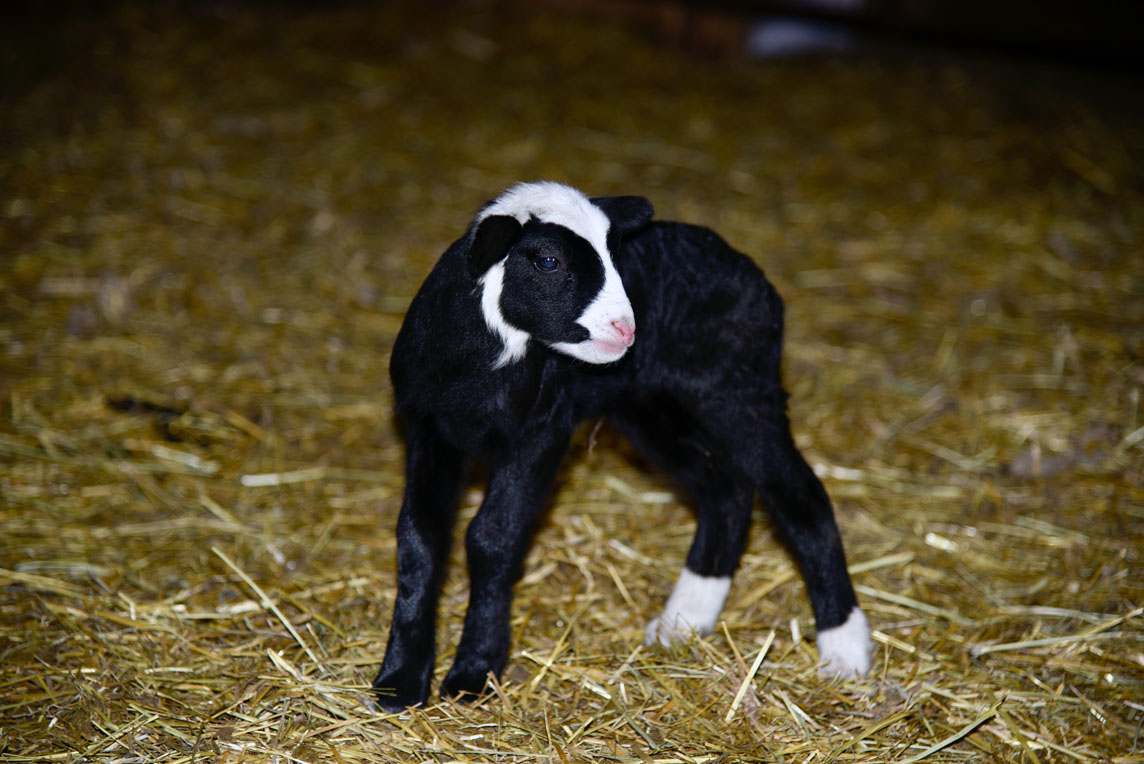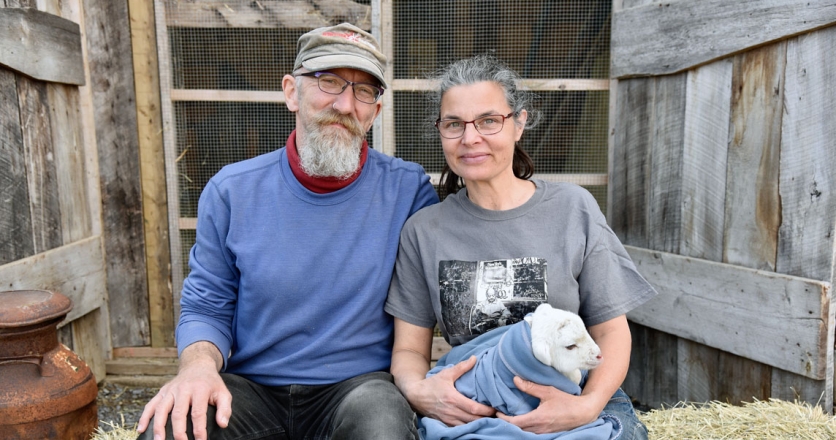A Tale of Many Ewes
Denise Bonin-Mount and Phil Mount combine expertise and compassion to embody their philosophy at Flat Earth Farm in Osgoode.
On a sunny, unseasonably warm April morning, Denise Bonin-Mount and Phil Mount of Flat Earth Farm tend to their flock of sheep. There’s drama afoot, as all adjust to the birth of five new lambs in the early hours the night before. Eight more ewes are still pregnant. Guard dog, Mirissa, so named for their favourite town in Sri Lanka, is on high alert. Mount describes the unfolding scene in the barn as an “odd dynamic,” with “three first-time moms who are very protective and territorial... they are all just learning.”
One little lamb has been rejected by its mother, Appaloosa, and the couple actively tries to reverse her decision. Bonin-Mount smears the rejected lamb with “fresh poop from its [sibling’s] first day alive... with the hope that when mom comes to that lamb, she will smell it and recognize a lamb that she’s accepted.” Bonin-Mount laments: “Unfortunately, she didn’t fall for it.”
Instead, that little lamb, whose fleece was white as snow, bonded with Bonin-Mount, and everywhere that she went, “that lamb was sure to go.” She affectionately names him Turnover, laughing, “After all, he turned over to me.” She bottle feeds the little guy a formula of fresh cow's milk plus an egg yolk, and points out a similar orphan from the year before who has clearly thrived on such a mix. Turnover has been temporarily placed aside in the barn as the social dynamics settle, and he’ll be reintroduced to the flock once all the lambs are born. His fate is much preferred to another lamb’s who was born with a broken neck. It takes a big heart to farm as joy and loss come hand in hand.
Bonin-Mount, who is the farmer on the property, grew up in Vancouver.
“As a kid, I always wanted to work with animals, and farming is where to be if you love animals. I am so happy. I learn so much from them.”
Her partner spent the first 20 years of his life on a dairy farm in the east end of what is now the City of Ottawa. His PhD looked at the growth of local and regional food systems, and he currently serves as associate director of Just Food and chair of Sustain Ontario, among other impressive research roles. The two have been together for 29 years, travelling extensively in rural areas, farming for the past 20 years, and raising livestock for the past 15 years. They consider the Ottawa region home.
Falling into sheep farming
Bonin-Mount says they fell into sheep farming.
“This [farm] just happened. We weren’t expecting to raise sheep. We originally wanted to raise goats. But, Phil’s brother’s friend needed knee surgery, his sheep needed caring for and we had an empty barn. So, the deal was, ‘You look after them for the winter, and you take half the lambs.’ That’s how we got our flock.
Special mention goes to Gallagher, a ram who bred with all these ewes. Significantly smaller than his multiple partners, apparently he gets so vertical, propped up on his hind legs, to perform his duties that he sometimes falls over backwards and bonks his head. Gallagher is a purebred Katahdin male — a breed known for its lean meat and docility, but the ewes are a mix of Suffolk and Dorper, both of which make friendly, docile and attentive mothers (with the notable exception of Appaloosa at the moment.) The ladies gently nudge visitors for a rub and a sniff. Mount feeds the new moms at several stations, to encourage milk production. Mirissa the dog remains attentive to her charges throughout. At one point, she begins playing tug-of-war with one of the ewe’s tails.
“She does the oddest things with the sheep, that you cannot fully appreciate unless you spend time out here and see her in full relaxation mode,” Mount says.
An agroecological approach
Mount describes agroecology as a “whole systems approach” that “integrates soil, crops and livestock with the surrounding natural environment, including its diverse living organisms.” He stresses the suitability of the land to sheep, since the soils are too shallow for cash cropping.
Mount describes agroecology as a “whole systems approach” that “integrates soil, crops and livestock with the surrounding natural environment, including its diverse living organisms.” He stresses the suitability of the land to sheep, since the soils are too shallow for cash cropping.
“This [became] farmland about 170 years ago, in the early 1850s, when it was cleared by a Scottish family, the Campbells, and immediately turned into a sheep farm.” However, over the past 30 years, the site has gone through a “process of rewilding, or going back to nature.” Respectful of the natural succession that has occurred, they have integrated larger trees and bushes on site and are adding different mixes of pasture grasses and legumes. Mount waxes on the immense nutritional benefits for the sheep they raise from having such natural diversity as part of their fodder.
“Our philosophy to the greater world applies equally to the farm,” says Mount, describing his approach as “much more intensive, but much less impactful.” They don’t do monoculture.
“Nothing is just one thing,” Bonin-Mount says. Together they incorporate many beneficial practices. They work to build soil, fertilizing with natural compost and adding in nitrogen-fixing legumes; plant companion crops for synergistic relations, such as carrots and lettuce, beets and kale; welcome a mix of breeds in their farm animals; eschew pesticides; and raise livestock on a scale commensurate to their ability to cycle nutrients across the landscape. From their research and travels, they find inspiration in folks from around the world who adopt agroforestry and agroecological practices, specifically, natural approaches applied to small farms.
Flat Earth Farm: What’s in a name?
Bonin-Mount explains that Flat Earth Farm emerged from “a conversation that went on at a dinner table” in which someone randomly mentioned “flat earth” and the couple immediately liked the ring of it.
Bonin-Mount explains that Flat Earth Farm emerged from “a conversation that went on at a dinner table” in which someone randomly mentioned “flat earth” and the couple immediately liked the ring of it.
“It rolls off the tongue,” Mount says.
They are drawn to its implicit nod to equity.
“It’s flat, so it’s levelling,” Bonin-Mount says, and, “there are ways to farm that can level the playing field.”
This is especially true since one of the most significant barriers to farming is lack of access to capital and thus land. They believe everyone should have the ability to farm, if that’s what they want to do. And although farmland prices have skyrocketed over the past eight years, they want to show it is possible even still to realize a vision.
“We don’t own any of this land, we rent all of it,” Bonin-Mount says.
They credit obliging landlords who are willing to have them farm the land and improve it. Mount adds that they are also contrarian by nature, and like to challenge dogmatic beliefs, such as the normalized idea of private land ownership.
“It really did attract us to use Flat Earth in a way that people wouldn’t immediately perceive.”
Raising chickens humanely
The couple also raises dual-purpose chickens, whose pedigree is blended such that they are good for laying eggs and growing meat. The flock combines five varieties, intentionally bringing in genetic diversity with new roosters, the current stud being a Rhode Island/Buff-Orpington mix. Among the crowd are five rescued Lohmanns — industrial laying hens. One hen clucks loudly to pronounce to the world that she has laid an egg. This brood of hens, and their lone rooster, who gamely services 40 girls when the average should be 10, are truly free range. In fact, sometimes the chickens cross Campbellcroft Road — apparently to get to the other side — but always manage to find their way back to the safety of their coop. Outside, they explore the cedars, the vegetable garden, the compost pile, while inside they rummage for missed barley in the barn. Rather than stewing her in a pot, Mount and Bonin-Mount are currently nursing an older chicken who was injured in an attack.
The couple also raises dual-purpose chickens, whose pedigree is blended such that they are good for laying eggs and growing meat. The flock combines five varieties, intentionally bringing in genetic diversity with new roosters, the current stud being a Rhode Island/Buff-Orpington mix. Among the crowd are five rescued Lohmanns — industrial laying hens. One hen clucks loudly to pronounce to the world that she has laid an egg. This brood of hens, and their lone rooster, who gamely services 40 girls when the average should be 10, are truly free range. In fact, sometimes the chickens cross Campbellcroft Road — apparently to get to the other side — but always manage to find their way back to the safety of their coop. Outside, they explore the cedars, the vegetable garden, the compost pile, while inside they rummage for missed barley in the barn. Rather than stewing her in a pot, Mount and Bonin-Mount are currently nursing an older chicken who was injured in an attack.
Open Food Network
To support Flat Earth Farm, shop online at Open Food Network for pickup at the Just Food Farm Gate Stand (monthly through winter, and weekly through summer). They offer a variety of products — lamb chops, lamb sausages, rack of lamb, ground lamb — plus maple syrup from a relative in the Lanark Highlands — and various products from Against the Grain — friends who grow ancient varieties of whole grains that are locally adapted.
To support Flat Earth Farm, shop online at Open Food Network for pickup at the Just Food Farm Gate Stand (monthly through winter, and weekly through summer). They offer a variety of products — lamb chops, lamb sausages, rack of lamb, ground lamb — plus maple syrup from a relative in the Lanark Highlands — and various products from Against the Grain — friends who grow ancient varieties of whole grains that are locally adapted.






